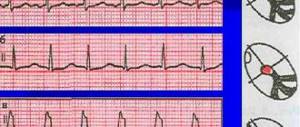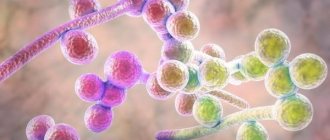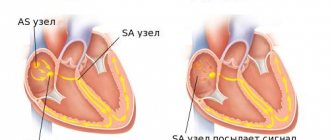In the midst of everyday activities and problems, we often lose sight of the most important thing - our health. Consulting doctors only in case of serious illness and ignoring annual medical examinations are mistakes that can sometimes cost lives.
Doctors are increasingly noting that “matters of the heart” today worry people already at the age of 30. This trend undoubtedly worries the medical community. If you don’t know how to strengthen your heart, advice from a cardiologist will show you the right path.
Prevention
Problems with the heart and blood vessels accumulate gradually. At the very beginning, you may not even notice a deterioration in your health and seek help at the last moment. The list of simple ways to strengthen your heart invariably includes physical activity, giving up bad habits and eating right.
The rules may seem simple only at first glance, because in fact, for the sake of health, some people will have to radically change their lifestyle. We will analyze each of the three points in detail - read our review for useful exercises, recipes and tips.
Overweight
Unfortunately, adults and independent people sometimes don’t even know how to strengthen their heart. Advice from a cardiologist primarily concerns nutrition. The main enemy of the heart is excess weight.
Studies have shown that obesity increases the risk of stroke and heart attack by 20 times. Working in the company of dozens of extra pounds requires serious changes from the body:
- the load on the heart increases fourfold;
- left ventricular hypertrophy appears;
- the blood becomes more viscous and thick due to decreased platelet activity.
The only reliable way to lose weight and ease the functioning of the whole body is proper nutrition. Increasing the amount of fruits and vegetables in the diet, choosing lean meat and dairy products of medium fat content, limiting sweets and flour - these are just some of the principles of a healthy diet.
How to treat cardiac arrhythmia
Arrhythmia is any condition in which the contractile activity of the heart is disrupted, that is, the heart rhythm differs from the normal sinus rhythm. Arrhythmia can lead to serious complications and pose a threat to the body’s vital functions, because treating cardiac arrhythmia is a very important issue.
What causes cardiac arrhythmia?
Whether arrhythmia can be cured depends on its causes. For example, if heart failure is caused by taking diuretics, cardiac glycosides or other drugs, changing therapy makes it possible to quickly adjust the heart rhythm. More serious intervention is necessary if the arrhythmia develops due to:
- lack or excess of potassium, magnesium, calcium;
- regular toxic effects of alcohol, nicotine, drugs or thyrotoxicosis due to hyperfunction of the thyroid gland;
- organic diseases - coronary heart disease, cardiomyopathy, myocarditis, myocardial infarction, congenital defects, mitral valve prolapse, etc.
From time to time, a person may experience natural arrhythmias that arise as a result of psycho-emotional arousal, fever, and increased physical exertion. As a rule, they go away on their own and do not require intervention.
Diet
Some products simply need to be included in the menu for those who care about vascular and heart health. Dark red and orange fruits strengthen the walls of blood vessels, vegetables and grains supply the body with fiber, and flaxseed oil and fish oil will become sources of important Omega-3 acids.
The question often arises about how to strengthen the heart and blood vessels using folk remedies. Since ancient times, hawthorn has been considered the main healer of our “motor”. Berry decoction reduces blood pressure, strengthens the nervous system, eliminates tachycardia and arrhythmia, and improves cerebral circulation.
Recipe
Pour one tablespoon of fruit into 300 ml of water and cook for 30 minutes. Let the drink brew, strain and take 50 ml before each meal.
What is coronary heart disease and its cause
The disease is caused by a systematic, constant lack of sufficient oxygen in the heart. The latter, as is known, enters the organs with blood. If for some reason blood circulation is impaired, then an acute lack of oxygen develops (hypoxia). In the case of the disease in question, the coronary arteries are responsible for the disruption of the blood supply to the heart muscle. The following factors can lead to disruption of these vessels’ functions.
- Aneurysm of the thoracic aorta. It interferes with the proper functioning of the valve between the aorta and the heart.
- Inflammation of the coronary arteries occurring in systemic connective tissue diseases (arteritis). Inflammatory processes lead to a narrowing of the blood flow channel.
- Cardiovascular syphilis. Damage to the coronary arteries and aorta, a complication against the background of a known venereal disease.
- Thrombosis and embolism. Changes in the composition of the blood often lead to the formation of blood clots and blockage of blood vessels.
- Atherosclerosis of the artery walls. The main cause of coronary heart disease. With this pathology, the lumen in the vessel narrows significantly, which complicates the passage of blood flow.
- Congenital abnormalities in the structure of the coronary arteries. Some heart defects can also form in utero.
- Hereditary predisposition to the disease. As a rule, most people suffering from ischemia have one or more older direct relatives who are familiar with this problem.
Risk factors
Quite often, active smokers with many years of experience are diagnosed with coronary heart disease. Tobacco smoke tends to narrow all blood vessels in the body, including those located in the heart area. Physical inactivity (lack of physical activity) can significantly worsen the condition of blood vessels. The risk is also high for those suffering from diabetes mellitus, due to disturbances in carbohydrate metabolism in the body.
In adulthood, blood vessels gradually lose their quality, so the risk of the disease increases with age.
A particular predisposition to the disease has been noted in overweight people. As a rule, this category includes lovers of fried, fatty and salty foods. Salt, as a chemical substance, itself contributes to the occurrence of atherosclerosis. Saturated fats speed up the process. Since the main cause of coronary heart disease is vascular sclerosis, overweight people are most susceptible to this disease.
Aerobic exercise
If you don’t know how to strengthen your heart, advice from a cardiologist will show you the right way. Lack of physical activity leads not only to excess weight, but also to weakening of the entire body.
Doctors recommend starting training gradually, because excessive load will aggravate the situation. A little exercise in the morning will help “wake up” the body, which must include raising your arms and legs, swinging, walking in place, rotating your torso, limbs and shoulders. Five minutes will be enough to get a boost of energy.
Make time for more active activities at least two to three times a week. We are talking about dancing, running, aerobics, cycling or any other cardio activity. Even evening walks at a fast pace are suitable as an alternative.
In city parks, you can increasingly see small groups of people with poles similar to ski poles. Nordic walking is an incredibly popular form of physical activity that trains endurance, improves coordination and balance, and burns 46% more calories compared to regular walking. Nordic walking trainers know how to improve heart health.
Advice from cardiologists pays attention to three main rules of cardio training:
- Monitor your pulse. The optimal value is 120-130 beats per minute.
- Don't set records. There's no point in exhausting yourself for hours at the nearest school stadium. Aerobic training should last no more than 60 minutes, for weak blood vessels – 30 minutes.
- Follow the regime. The desired result will be brought by 2-3 workouts per week.
What drugs reduce cardiac stress?
So what medications treat heart failure? Typically, the standard drug therapy regimen involves the use of a loop diuretic.
How else to treat chronic heart failure? For example, experts prescribe a drug such as Digoxin. It is the drug that is considered an effective cardiac glycoside. In addition, it is recommended to take it with the medications described above.
In order to reduce the likelihood of developing acute heart failure, Spironolactone is prescribed. If there is concomitant angina, then taking nitrates is necessary. And anticoagulants are prescribed, in turn, in order to eliminate the possibility of blood clots.
This section of the article will discuss recipes for alternative medicines.
So how to treat cardiopulmonary failure? Asparagus is very healthy. To prepare the product you will need a whole plant. Three tablespoons of asparagus are poured with boiled water, and then infused for a couple of hours. The infusion should be taken every two hours, one large spoon.
In this section of the article you can find the answer to the question: “How to treat edema in heart failure?”
So, in this case, lovage root tincture will come to the rescue. You will need 100 grams of this herb. It is filled with medical alcohol and then sent to a dark place for half a month. The finished tincture should be drunk three times a day, one large spoon.
In this section of the article we will talk about soothing teas.
So how do you treat heart failure in people? A collection of herbs such as lemon balm, mint and valerian helps well. The contents are poured with a glass of boiled water, then infused for 20 minutes. It should be consumed twice a day, half a cup before meals.
Cigarettes, coffee and alcohol
Giving up bad habits is perhaps the most important item on our list. During your next smoke break at work, you can only dream about how to strengthen your heart. The cardiologist’s advice in this case is categorical:
- Nicotine. Helps increase blood pressure and blood viscosity, increases heart rate and destroys the walls of blood vessels.
- Alcohol. The load on the heart during alcohol intoxication increases several times. You are literally poisoning him with toxic substances. Heavy drinkers are three times more likely to suffer from cardiovascular disease.
- Coffee. Drinking more than four cups of aromatic drink a day can lead to a heart attack, especially if you combine coffee and cigarettes.
Do you want to strengthen your heart? Advice from a cardiologist encourages you to remember to get proper rest. Stress at work, lack of sleep, jet lag – emotional stress negatively affects the functioning of the cardiovascular system.
Can hypertension be cured?
Recently, the treatment of heart failure using traditional methods has been approved by many doctors of medical sciences. Treatment of heart failure at home can be carried out using natural herbal remedies. Tinctures, infusions and decoctions of medicinal plants are used.
Dried ginseng root can be consumed either in crushed dry form (25 milligrams 3 times a day) or in the form of an alcohol tincture. To prepare the tincture you will need one part of the dried root and ten parts of 70% alcohol. It is recommended to take 2 times a day (morning and evening) 15 drops of tincture.
Peppermint is an effective folk remedy for strengthening the heart muscle. A decoction is prepared from the dry leaves of this medicinal plant, which must be taken for a long time in the morning on an empty stomach (for 12–24 months). For a glass of boiling water, you need to take one teaspoon of mint leaves, leave for 20 minutes after wrapping the vessel with the decoction.
Green bean decoction: dried pods (30 grams) must be filled with water (300 milliliters). This composition should be boiled for 15 minutes and then left for another 40–50 minutes. Dosage regimen: 3 times a day, 35 milliliters of decoction.
The following recipe will help reduce swelling in the lower extremities. The parsley along with the roots must be thoroughly washed and chopped using a meat grinder, you should get one glass of raw material.
It is poured with boiling water (400 milliliters) and left to brew in a warm place for 8.5 hours. The composition must be filtered and the juice obtained from one lemon added.
Take according to the following scheme: drink the medicine for two days, then take a break for three days, after which take the composition for another two days. For each dose, take 1/3 of a glass.
Treatment of heart failure is a long process that requires methodical care of your body.
In this case, folk remedies that relieve symptoms and alleviate the patient’s suffering can provide invaluable assistance.
Let's figure it out together - what folk remedies for heart failure can help improve your health.
Digitalis
This plant contains digitalis, which stimulates the contraction of the heart muscle and activates blood flow. For the treatment of left ventricular failure, digitalis purpurea, grandiflora and foxglove rusty are recommended.
And for the right ventricle - woolly, since it also has a diuretic effect, relieving swelling.
IMPORTANT! Ciliated foxglove is not recommended for use for medicinal purposes, since this type of plant may have different concentrations of digitalis in the leaves depending on the place of growth.
Mode of application. Grind the dry leaves of the plant into powder and take 0.05 g four times a day. In some cases, the doctor may advise increasing the dose to 0.1 g. The main condition for treatment with this folk remedy is not to exceed the daily dose of 0.5 g.
REFERENCE. Treatment with digitalis should only be done under medical supervision, as digitalis is a toxic substance.
Treatment with this plant should be carried out very carefully for paroxysmal ventricular tachycardia.
Digitalis has a cumulative effect, that is, it begins to act over time as it accumulates in the body. Sometimes side effects may occur in the form of nausea, dizziness, and fluid retention in the body due to incompatibility of the drug with the kidneys.
In this case, you should immediately stop taking the drug. Your doctor may prescribe an intravenous infusion of potassium chloride.
Diuretics for swelling of the legs
One of the common manifestations of almost all heart diseases is heart failure. The inability of the heart muscle to pump volumes of blood leads to serious health problems.
How to treat heart failure with medications?
A patient with this diagnosis does not have to take all medications recommended to treat the disease.
Heart failure often accompanies diseases such as atherosclerosis, arrhythmia, myocardial infarction and congenital heart defects. Taking into account the decrease in the functionality of one or another ventricle of the heart, several forms of the disease are distinguished:
- Left ventricular failure;
- Right ventricular failure;
- Biventricular failure (contractility of both ventricles is impaired).
How to treat heart failure?
As is known, acute and chronic heart failure are among the leading causes of mortality from cardiovascular diseases, which, due to the extreme prevalence of this type of pathology, makes the treatment of these two conditions a very serious problem.
What is the treatment of heart failure, what is the role of the doctor, and what can the patient do? What are the chances of survival for a patient with heart failure? We devote this article to these and other issues related to the treatment of heart failure.
Is heart failure curable?
That is, heart failure is always a consequence of other diseases. If we transfer these considerations to the field of treatment of heart failure, it becomes clear that on the one hand it is necessary to deal with the symptoms of heart failure itself (symptomatic treatment), and on the other hand it is necessary to treat the underlying disease that undermines the work of the heart, that is, the cause of heart failure (see .
Causes of heart failure).
In light of the above, we can conclude that heart failure is curable to the extent that the cardiovascular disease that provoked it is curable.
Taking into account the fact that acute heart failure is a medical emergency that requires urgent qualified intervention by cardiologists, in this article we would like to focus on the treatment of chronic heart failure, as well as methods of its prevention.
What are the main areas of treatment for heart failure?
Treatment of heart failure and the disease that provokes it is always a complex and time-consuming process. The main directions (goals) of treatment of heart failure are:
- Elimination of symptoms of the disease (symptomatic treatment);
- Protection of the organs most affected by heart failure (kidneys, brain, blood vessels);
- Improving the quality of life of patients and prolonging their life.
Achieving these goals becomes possible with the help of various treatment methods carried out under the supervision of a specialist physician observing the patient.
How do you start treating heart failure?
Treatment of chronic heart failure begins with the elimination of risk factors that worsen the prognosis of this disease. To achieve good results, it is important that a patient with heart failure:
- Quit smoking and alcohol;
- Followed the doctor's instructions for the treatment of arterial hypertension and other diseases of the cardiovascular system;
- Has taken measures to reduce body weight if he is obese;
- Reduced table salt consumption to a minimum;
- Followed a diet low in cholesterol and animal fats;
- I diversified my life as much as possible with physical activity.
Exercise for heart failure
Contrary to the deep-rooted belief that patients with heart failure should be protected as much as possible from all kinds of physical activity, there are currently a number of reports proving that moderate and balanced physical activity not only improves the general condition of the patient with heart failure, but also slows down the development of heart failure itself. diseases.
On the contrary, a complete refusal of physical activity leads to a significant decrease in the patient’s physical potential and actually makes him disabled. In case of heart failure, physical effort is contraindicated only if there are clear signs of an unfavorable course of the disease, severe edema (FC IV-III).
For heart failure, walking, breathing exercises, and swimming are especially useful. It is important that physical activity does not tire the patient.
If after “training” the patient complains of weakness and fatigue, then the level of stress must be reduced.
Diet for heart failure
Heart failure often occurs against the background of various metabolic disorders. For example, diabetes mellitus (impaired metabolism of carbohydrates and fats) is quite often combined with heart failure, and disturbances of water-salt metabolism (retention of water and salts in the body) can generally be considered an integral part of the heart failure syndrome.
We also add that such metabolic disorders significantly complicate the course of heart failure. That is why in the treatment of heart failure much attention is paid to nutritional treatment.
The principles of nutritional treatment of heart failure are:
- Limiting the consumption of foods rich in cholesterol and animal fats;
- Limiting the total calorie content of food (up to 1900-2500 kcal) and avoiding foods rich in easily digestible carbohydrates (sweets, flour products, sweet fruits, honey);
- Limiting salt consumption (up to 5-6 g per day, including salt already contained in prepared dishes and products);
- Limit fluid consumption to 1.5 liters. (including liquid dishes, tea, juices, etc.). A more severe restriction of fluid intake can only aggravate the patient's condition and is therefore not recommended.
- Eating foods rich in potassium: raisins, dried apricots, bananas, potatoes, peaches, oatmeal, buckwheat).
- Enrichment of food with foods high in polyunsaturated fatty acids: vegetable oils, olives, fatty fish.
They will be needed in order to avoid further complications. Before answering the question: “How to treat heart failure in older people?” Let’s consider some recommendations.
So, therapy includes not only taking medications, but also a correct lifestyle.
This means giving up smoking and alcohol abuse. In addition, you should monitor the amount of salt in your food. It should be lightly salted. It is also necessary to monitor the amount of liquid you drink. Its volume should not exceed 1.6 liters.
It is also necessary to maintain mandatory control over body weight. Physical activity should also be limited or kept to a minimum. In severe condition of the patient, only bed rest is recommended.
Treatment for this disease is considered effective if the patient and the attending physician notice that symptoms such as shortness of breath and rapid heartbeat have decreased. In addition, one of the obvious characteristics is an increase in the amount of blood that is ejected by the left ventricle, as well as the absence of clinical manifestations of fluid retention in the tissues.
As a rule, after all measures have been taken to assist the patient, and also when his condition has stabilized, he is discharged from the hospital.
The long course of the disease requires the use of unconventional methods of therapy. At the same time, you should know that everything must be consistent with the recommendations of the attending physician. Also, do not forget about diet and medication.
How to treat heart failure with folk remedies? The fact is that there are many recipes for decoctions and infusions that are recommended for the presence of this disease. Each of them will be discussed in the following sections of the article.
Do not forget that acute heart failure does not require treatment with alternative medicine. Because here we are talking about an emergency situation that requires urgent use of medications. Therefore, in this case, you should contact an ambulance.
The goal of treating heart failure is to increase the patient's life expectancy and improve his quality of life. They try, first of all, to cure the underlying disease that led to this condition.
Surgical methods are often used. To cure heart failure, it is necessary to increase the contractility of the heart and reduce the load on it.
The patient is advised to reduce physical activity and get plenty of rest. It is important to reduce the amount of fat and salt in food.
You also need to lead a healthy lifestyle.
“Hypertension” is a word that denotes an increase in blood pressure not only in hearing, many people experience it directly. How to cure hypertension forever? Is it possible? These important issues are of interest to many people, thousands of doctors are working on them, because treatment for the sake of treatment itself does not make sense.
Causes of hypertension
Identifying the situation that influences health changes is very important. This will influence the determination of the treatment method. High blood pressure is caused by vasoconstriction, causing blood to press against the walls of the arteries. What causes this condition? Taking into account all the causes, hypertension is divided into primary and secondary.
About 10% of all cases are allocated to diagnose secondary hypertension. About 95% is allocated to the primary disease. Primary hypertension is caused by a violation of pressure, which is influenced by many different factors not related to disruption of the functioning of other organs. Reasons influencing the manifestation of pathology:
- Heredity is the main factor influencing the development of primary hypertension;
- Atherosclerosis. The accumulation of fats and salt inside the walls of blood vessels leads to a narrowing of their openings.
- Deviations in the structure of blood vessels (loss of elasticity).
- Muscle tone of arterial walls.
- Stressful situations.
- Excess weight.
Chronic heart failure complicates many diseases of the cardiovascular system. Its treatment should be carried out for a long time as prescribed and under the supervision of a doctor. However, folk remedies can also be used after consultation with a doctor. Treatment with folk remedies for heart failure may include the following components:
- Diuretics.
- Foods rich in potassium.
- Plants that stimulate contractility of the heart muscle.












